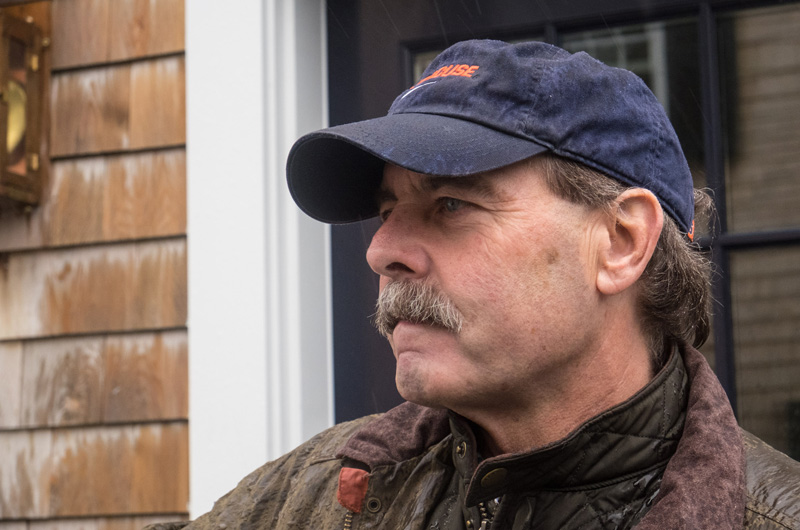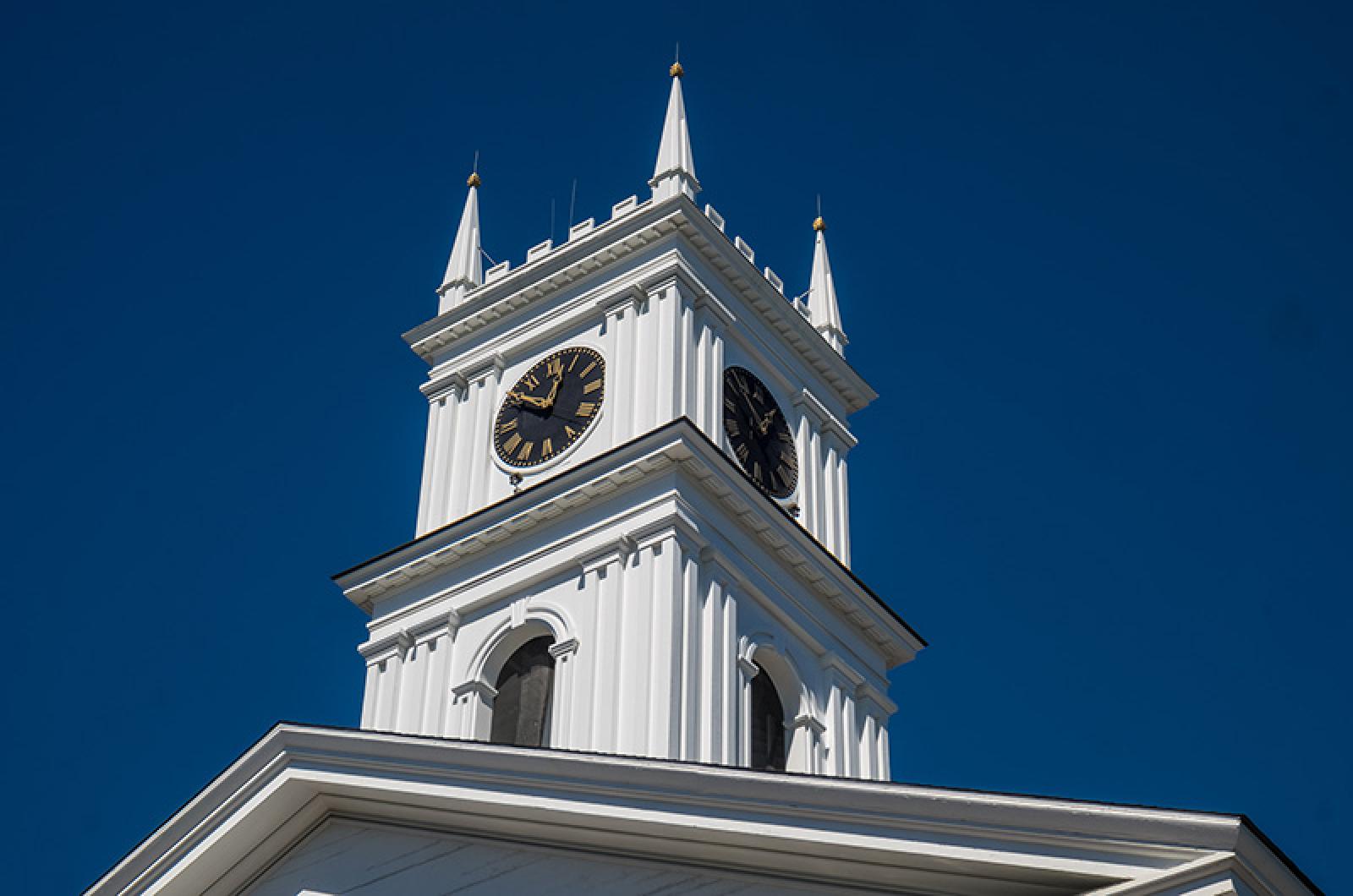With funding indefinitely on hold for restoration work at two of its landmark properties and the hasty resignation of its executive director, the Vineyard Trust is grappling with an array of issues — both internal and external — as it works to regain public confidence amid the recent upheaval.
Changes on the board of trustees, a new conflict of interest policy and possibly even a return to its former name are all now on the table for discussion at the Trust, according to board chairman Patrick Ahearn, who spoke with the Gazette in two lengthy phone interviews this week.
“Going forward, the board will take on a more active role that traditionally has not been offered to it in the past,” Mr. Ahearn said, adding: “There’s nothing nefarious happening at the Trust.”
Three weeks ago Trust executive director Funi Burdick resigned after altered documents were discovered in Community Preservation Act funding applications for work on the Old Whaling Church in Edgartown and the Flying Horses in Oak Bluffs. Both towns have put the public funding on hold — $170,000 in Edgartown and $72,000 in Oak Bluffs. An investigation by state and local police into the irregularities remains ongoing.
Mr. Ahearn said the work on the two properties will wait until the next round of CPA funding applications become available, likely in late 2021.
“For the moment, we’re just going to keep everything on hold,” he said.
Meanwhile, he said the board is focused on steering the Trust in a positive direction, calling the actions by Ms. Burdick an honest but unforgivable mistake. He vowed that the Trust’s governance committee — an executive committee headed by trustee Robert Graham — would exert greater oversight on staff and business in the future in an effort to rebuild trust in the community.

“The executive committee that I formed with all five past chairmen really looked at this thing, and really wanted to understand exactly what happened. And when it was determined that what Funi did was not supportable, she resigned,” Mr. Ahearn said.
The Trust owns and maintains 20 historic buildings around the Island. All are in active use either with business tenants or for public use, according to its mission.
But there has been internal tension this year on a variety of fronts with properties, and part of the recent fallout includes criticism of the Trust for leasing two of its properties to board members.
A building at 45 Dock street on the Edgartown harbor that is part of the old Osborne wharf saw a change of use in 2019 when the lease was not renewed for the Martha’s Vineyard Shipyard. The shipyard had been a longtime tenant, running a small marine supply store in the building. Today the building is a real estate office for Landvest, whose principal Gerret Conover is a board member for the Trust.
More recently, the Trust announced that it had signed a lease with the owners of LeRoux at Home to take over management of Alley’s General Store in West Tisbury, beginning this summer. LeRoux co-owner Michael Levandowski is a trustee of the Trust.
The Trust’s bylaws do not include a specific conflict of interest policy. Nonprofits are required to disclose on their IRS tax form C 990 whether the organization has leased assets to or from a related party or been indebted to a related party. Related party transactions include those with Trustees, according to brief IRS definitions provided on the document.
The Trust’s most recent publicly available tax filing from 2019 does not disclose any transactions with related parties.
But Mr. Ahearn staunchly defended the ability of board members to lease property owned by the Trust.
He said that Mr. Levandowski’s offer to lease Alley’s was accepted by a vote of the board, that Mr. Levandowski was not involved in the vote, and that the offer was reviewed for conflict of interest concerns.
“That was cleared,” Mr. Ahearn said. “And I can’t say who and what and how because I wasn’t directly part of that, but the question was raised . . . someone did review the bylaws to determine that there was not a conflict of interest.”
He declined to provide a copy of the lease, saying it was a private document, and could not offer more specifics on scrutiny provided by the board. “That was not my role,” Mr. Ahearn said. But he did further explain the interest in renting out Alley’s to a third-party vendor.
“The Trust is not in the retail business,” he said. “We didn’t operate it really very well, or even make a profit. Now we have someone with the right mindset, with a true retail experience, who wants to operate it as a genuine and authentic general store . . . which supports the mission of the Trust — putting an endangered building back into public use.”
He said strict lease covenants in place give the Trust oversight on the store’s inventory
“Michael cannot turn it into a Brookstone,” Mr. Ahearn said. “The Trust has all the protections, all the latches on making sure that it is a general store.”
The store remained closed this week. Mr. Ahearn said upgrades were under way and he did not know exactly when the store would reopen, but that it would be this summer.
“I believe that’s the intent,” he said.
He also strongly defended the decision to lease the Osborne wharf property to Mr. Conover, saying that it is actually owned by a separate, for-profit entity known as the North Water Street Corporation, an affiliate of the Trust. Assessors records list the owner of the building as the Vineyard Trust.
“These are two separate corporations and two separate issues,” Mr. Ahearn said. “The North Water Street Corporation is essentially a for-profit corporation in the business of leasing and maintaining real estate. We had a tenant — the building was not being maintained, was in a substandard, market rent situation, and someone stepped up and was willing to put their own money into it and sign a lease at market rate . . . so that seems to be pretty straightforward. If that person was a Trustee or not, that was an appropriate transaction in terms of the North Water Street Corporation.”
In another matter, late this winter a rent dispute arose with tenants in the property at 12 North Water street, which is listed in assessors records as owned by the North Water Street Corporation. Although the dispute was ultimately settled and existing leases were extended for one year, Mr. Ahearn said the Trust has since worked with tenants to come up with a long-term plan for rent increases. “We have a number of rental structures that are not market-rate based on where the market is today,” he said. “And . . . the North Water Street Corporation needs to be able to support itself.”
Two commercial tenants at 12 North Water street have since left, according to people familiar with the situation.
Mr. Ahearn said the governance committee is in the process of writing a conflict of interest policy.
“The committee is going to take a much closer look at all of these issues,” he said. “The board was never involved in the daily activities of the Trust — the sole responsibility for that rested with the executive director and his or her staff. And that’s the message that’s confused right now.”
Three years ago the Trust changed its name from the Martha’s Vineyard Preservation Trust to Vineyard Trust, after hiring a branding consultant firm.
Mr. Ahearn said he expected the board to consider changing the name back to the Martha’s Vineyard Preservation Trust at an upcoming meeting, noting that some Trustees were unhappy with the new name despite a unanimous vote three years ago to support the change.
For himself, Mr. Ahearn said his term as chairman of the board (extended for a fourth year last summer due to the pandemic) will end next month, and leadership of the organization will pass on to someone new.







Comments (34)
Comments
Comment policy »